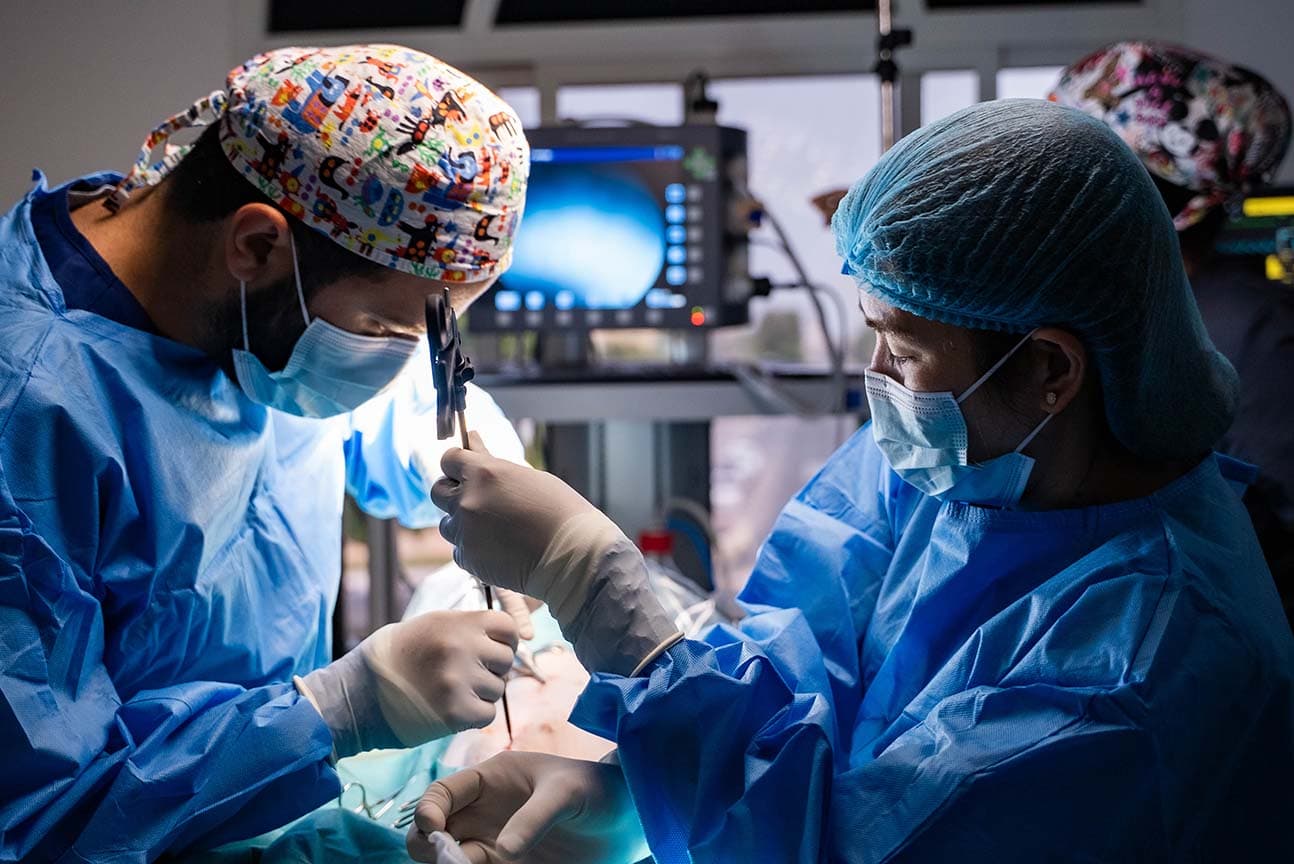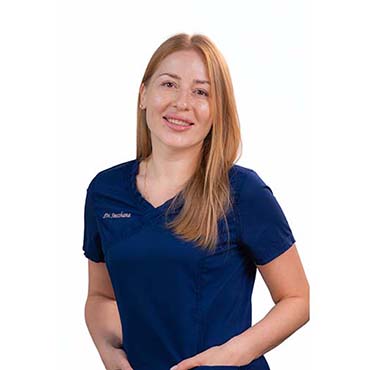Reviewed by Dr. Snezhana Pochkalina
Updated on 22/09/2025
Reading time 4 min.
Overview
Severity: Low
Life stage: All
Castration is one of the most common surgeries performed in veterinary practice. It’s normal for dog owners to have questions before deciding if it’s the right step for their pet.
At Modern Vet, we aim to provide clear information about the procedure, its benefits, and what to expect during recovery, particularly in Dubai’s climate, so that you can make an informed choice for your pet’s health and well-being.
Every dog and family situation is unique. Consider your lifestyle, your dog’s behaviour, and your long-term plans. Many Dubai pet parents find castration enhances their relationship with their dog, making outings more enjoyable and reducing stress-related behaviours.
What Is Dog Castration?
Castration, also called neutering, is a routine surgical procedure where the testicles are removed. It’s one of the most commonly performed surgeries in veterinary medicine worldwide.
The procedure is performed under general anesthesia. This means your dog is asleep and feels no pain during the surgery. Most dogs are back to their normal behaviour within a few days, though full recovery takes about two weeks.
Why Consider Castration for Your Dog?
There are many benefits of castration, including population control. This is particularly important in a bustling city like Dubai, where responsible pet ownership matters enormously.
Health Benefits
- Removes the risk of testicular cancer: This aggressive cancer occurs only in intact (unneutered) males, so castrated dogs are not affected.
- Significantly reduces the risk of prostate problems: Older unneutered males are prone to enlarged prostates, which can cause discomfort and urinary issues. Castration significantly lowers this risk.
- Prevents complications from cryptorchidism: Undescended testicles have a much higher chance of becoming cancerous. Castration is the recommended treatment for dogs with this condition.
Behavioural Improvements
Many pet parents notice positive changes in their dog’s behaviour after castration:
- Reduced roaming instincts
- Less aggressive behaviour towards other male dogs, making park visits and walks more enjoyable
- Decreased marking inside your home (though established habits may take time to reduce)
- Reduced mounting behaviour
Dubai-Specific Considerations
Living in the UAE brings unique factors to consider. Dubai Municipality requires all dogs to be registered and microchipped. Many housing compounds and hotels prefer or require neutered pets. Additionally, with Dubai’s growing pet-friendly community, a well-behaved, neutered dog is more welcome at dog parks and social events.
When Should You Castrate Your Dog?
The ideal timing depends on your dog’s breed, size, and individual development. Your vet can recommend a tailored recommendation to ensure the best timing. Generally, we recommend:
Small breeds (under 10kg): 6-9 months old
Medium breeds to Large breeds: 14-18 months
Giant breeds (over 25kg): 18-24 months old
However, every dog is unique. Large breeds benefit from waiting until their growth plates close, whilst smaller dogs can be safely castrated earlier. During Dubai’s summer months, many owners prefer scheduling the procedure during cooler seasons for more comfortable recovery.
The Castration Procedure: What to Expect
Understanding the process helps relieve those pre-surgery nerves that every pet parent experiences.
Before Surgery
Arrange a pre-operative consultation with your vet to examine your dog thoroughly and discuss any concerns. You’ll receive detailed pre-surgery instructions, including fasting guidelines.
During Surgery
The procedure itself usually takes around 30 to 40 minutes. Your dog receives a general anaesthetic and is carefully monitored throughout. The procedure involves making a small incision in front of the scrotum, removing both testicles, and closing the incision with stitches.
Recovery
Most dogs can go home the same day, though some may stay overnight for observation. Your veterinarian will provide comprehensive aftercare instructions tailored to your dog’s needs and the clinic’s protocols.
Chemical Castration for Dogs
Chemical castration is a temporary, non-surgical method to control fertility in male dogs. It involves placing a small implant under the skin that gradually releases a synthetic hormone to suppress fertility. The effect typically lasts 6 to 12 months and is fully reversible. Unlike surgical castration, it does not require general anaesthesia.
While generally safe, chemical castration can still cause side effects, so it’s important to discuss this option with your veterinarian to see if it’s suitable for your dog.
Post-Surgery Care in Dubai’s Climate
The first 48 hours
- Keep your dog indoors in air conditioning as much as possible. The heat can increase swelling and discomfort, so a cool environment is important for healing.
- Strict rest is extremely important for wound healing. Short, gentle walks for toilet breaks only, preferably during early morning or late evening.
Week 1-2: Gradual return to normal
- Monitor the incision site daily for any signs of infection, swelling, or unusual discharge.
- Prevent licking or chewing. Use a medical suit or collar if necessary.
- Keep your dog calm and quiet.
- It’s important to reintroduce exercise gradually with short, gentle walks at first.
- Avoid swimming until your veterinarian confirms the wound has healed completely.
Dubai Weather Considerations
Arrange surgery during cooler months (November to March) when possible. If summer surgery is necessary, ensure excellent air conditioning and avoid outdoor activities, especially during peak heat hours (10 AM to 4 PM).
Managing Your Dog’s Weight After Castration
With a balanced diet and regular exercise, neutered dogs can maintain a healthy weight and stay active. Many also show reduced unwanted behaviours while remaining affectionate and playful. However, hormonal changes after neutering can slow metabolism, making weight management more important.
- Adjust food portions accordingly and regularly monitor your dog’s body condition.
- Increase exercise gradually after they have fully recovered from the procedure.
If you’re worried about your pet’s weight or want advice on keeping it under control, speak to one of our vets at Modern Vet for guidance and support.
Cost Considerations in Dubai
Castration costs vary based on your dog’s size and any additional services required. At Modern Vet, we believe in transparent pricing and will provide a detailed estimate during your consultation. Think of castration as a way to support your dog’s long-term health and well-being. It can also help prevent certain medical problems down the line, saving you stress and costly treatments in the future.
Risks of castration
Castration is a routine and commonly performed procedure. Like any surgery, it involves general anaesthesia, but serious complications are rare. Larger or overweight pets may require extra care, and your veterinarian will take all necessary precautions to ensure a safe and smooth procedure.
Mild complications can occur around the surgical site, including:
- Bruising
- Swelling
- Infection
More serious complications, including:
- Anaesthetic risks
- Bleeding (haemorrhage)
Modern anaesthetics and careful monitoring make serious complications very uncommon.
You can further reduce the risk by following your veterinarian’s instructions for rest and preventing your dog from licking or disturbing the surgical site during recovery.
Considering castration for your dog? Book a consultation today at Modern Vet Hospital in Dubai. Our experienced veterinary team will guide you through the procedure, explain the benefits, and provide the highest standard of care before, during, and after surgery.
From the initial check-up to recovery support, Modern Vet Hospital is your trusted partner for safe, compassionate castration services and lifelong pet wellbeing.
Share this, choose your platform!
Reviewed by
Dr. Snezhana Pochkalina
DVM
Dr. Snezhana was born and raised in a small town called Yelabug in Russia. She comes from a family of veterinarians who also owned a small farm. At 16 years old she graduated from high school and moved to a town called Kazan to continue her education. Dr. Snezhana graduated from the Kazan State Academy of Veterinary Medicine in 2010.


